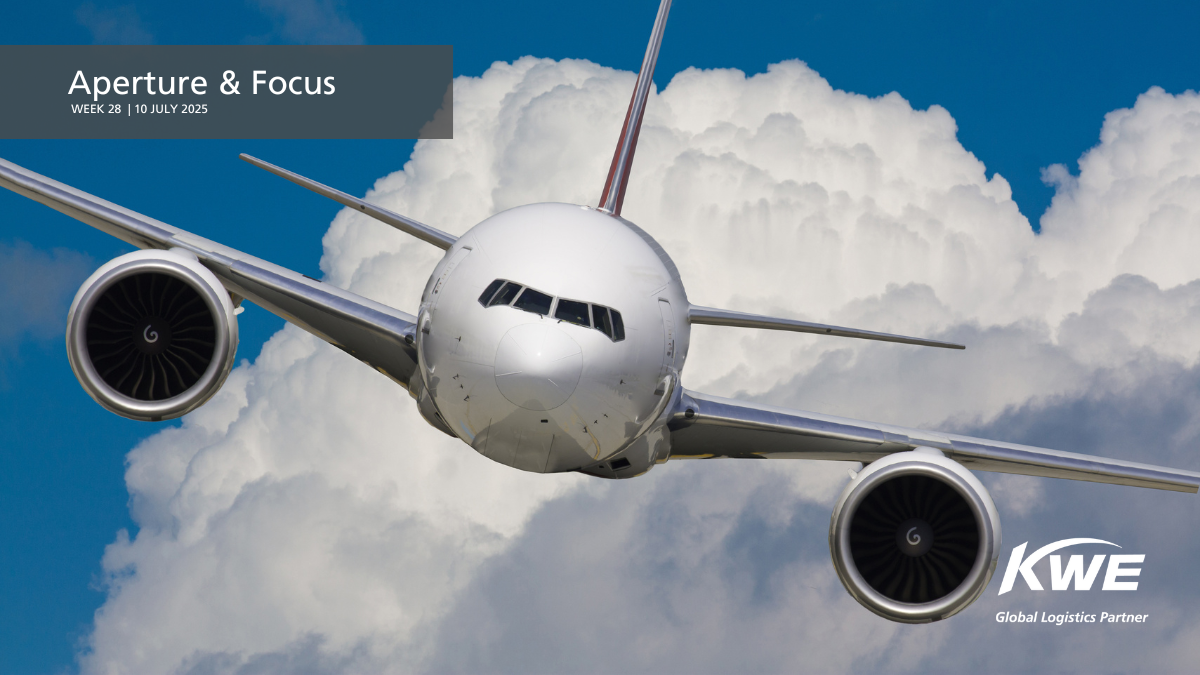Quote
Aperture & Focus 2025: Week 28

Global Aperture
Air cargo volumes rose 9.9% worldwide in 2024, reaching nearly 127 million metric tons, according to the 2025 edition of Airports Council International (ACI) World’s World Airport Traffic Dataset. Growth was fueled by shifting maritime trade routes, rising cross-border e-commerce demand, and falling jet fuel costs, with the top 20 cargo hubs handling over 52 million tons—10.8% above pre-pandemic levels.
In June 2025, however, global air cargo volumes rose just 1% year-over-year according to the latest data from Xeneta, while available capacity increased by 2%, reflecting slowed demand amid consumer caution and tariff-related uncertainty. As a result, shippers are increasingly turning to shorter-term contracts to preserve flexibility in an unstable market.
In May 2025, global container shipping schedule reliability improved sharply to 65.8%, reaching its highest level since November 2023 and continuing steady gains from earlier in the year. SeaIntelligence noted that new alliance rollouts in July 2025 will allow for a more complete performance evaluation across the industry. U.S. tariff policy, on the other hand, is leading to blank sailings and route changes with negative impact to schedule reliability.
Regional Focus
Americas
United States: The end of the de minimis tax exemption for many Chinese goods has sharply reduced demand for air cargo shipments to the U.S., particularly among e-commerce sellers. Since the rule change took effect on July 1, 2025, some companies have halted shipments entirely or begun exploring alternative entry strategies to avoid added costs and delays.
President Trump’s new US–Vietnam trade deal imposes a 20% tariff on Vietnamese exports and a 40% tariff on transshipped goods, signaling that US tariffs on Chinese imports may remain high despite ongoing negotiations. China, while honoring a recent trade truce, has warned it will retaliate if US agreements with countries like Vietnam or India undermine its economic interests.
Meanwhile, Trump signed an executive order extending the pause on new tariffs for several U.S. trading partners from July 9th to August 1st—excluding China—with notable rate reductions for Cambodia and Laos. A new U.S.-China deal includes the resumption of rare earth metal trade and easing of U.S. countermeasures, though tariff levels remain unclear.
U.S. rail freight saw mixed results in June 2025, with domestic carloads rising 2.1% year-on-year—driven by gains in coal, grain, and industrial commodities—while intermodal traffic fell 2.9%, ending nearly two years of growth. The Association of American Railroads attributes the shift to volatile global supply chains, softened demand, and broader economic uncertainty heading into the second half of the year.
Asia-Pacific
Air cargo exports from Asia to the U.S. continued to decline sharply in June 2025, with direct freighter capacity down 11% from March and e-commerce bookings falling 50% in both May and June, following the end of the de minimis tax exemption for low-value Chinese parcels. As a result, major e-commerce platforms have shifted focus to Europe and Southeast Asia amid ongoing U.S.-China trade uncertainty.
Hong Kong: Hong Kong International Airport (HKG) retained its position as the world’s busiest cargo airport in 2024, with cargo volumes rising 14.1% year over year. According to the 2025 edition of Airports Council International (ACI) World’s World Airport Traffic Dataset, the airport’s expansion to a three-runway system now enables it to handle up to 10 million metric tons annually.
Europe, Middle East & Africa
A surge in Chinese exports to Europe—driven by falling U.S. demand and tariff-related rerouting—has caused severe congestion at major ports like Rotterdam, Antwerp, and Hamburg, with delays of up to two days. Labor shortages, inland transport disruptions, and infrastructure strain are compounding the bottlenecks, which are expected to persist through July.
Unusually low water levels on the Danube, Vistula, and Rhine rivers due to a severe heatwave are disrupting inland shipping across Central Europe, forcing vessels to operate at 30–40% capacity. The drought-induced constraints are impacting regional trade flows, ecosystems, and transport reliability along key European logistics corridors.
Germany: Leipzig/Halle Airport has broken ground on a new 28,000-square-meter air cargo facility to support continued logistics growth. Scheduled for completion by mid-2026, the warehouse will feature direct apron access and aims to strengthen the airport’s role as a key European cargo hub.
United Kingdom: Over 100 unionized employees of the International Transport Workers' Federation (ITF) will go on strike in London from July 22nd to July 29th to protest planned layoffs that would cut staff by a quarter, while top leadership salaries have risen sharply. Represented by Unite, the workers criticize the cuts as harmful to collective bargaining and seafarer advocacy, and the strike is already disrupting ITF’s core operations—delaying seafarer case handling, weakening wage enforcement efforts, and stalling global labor negotiations.